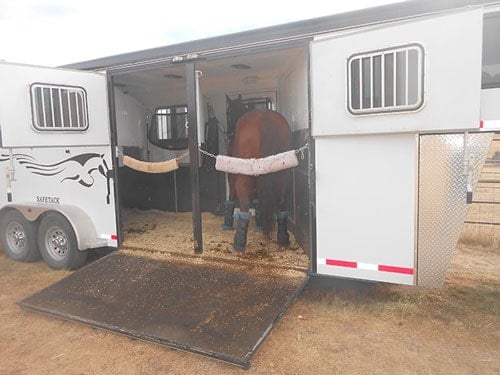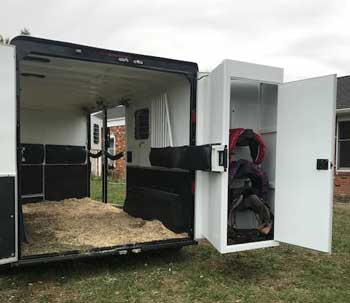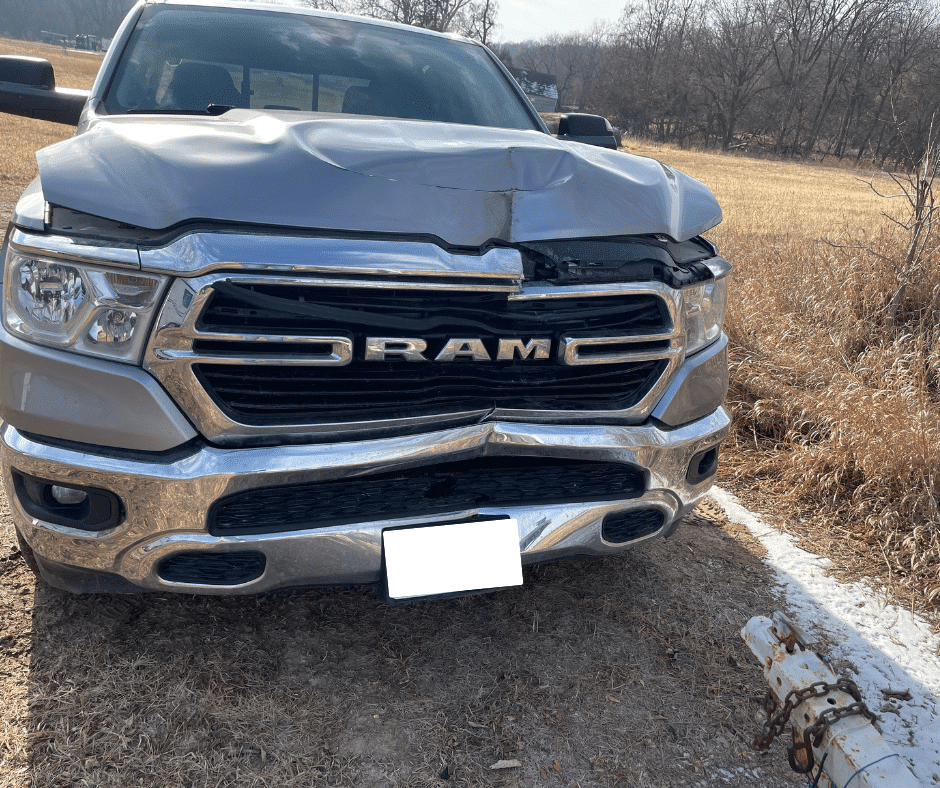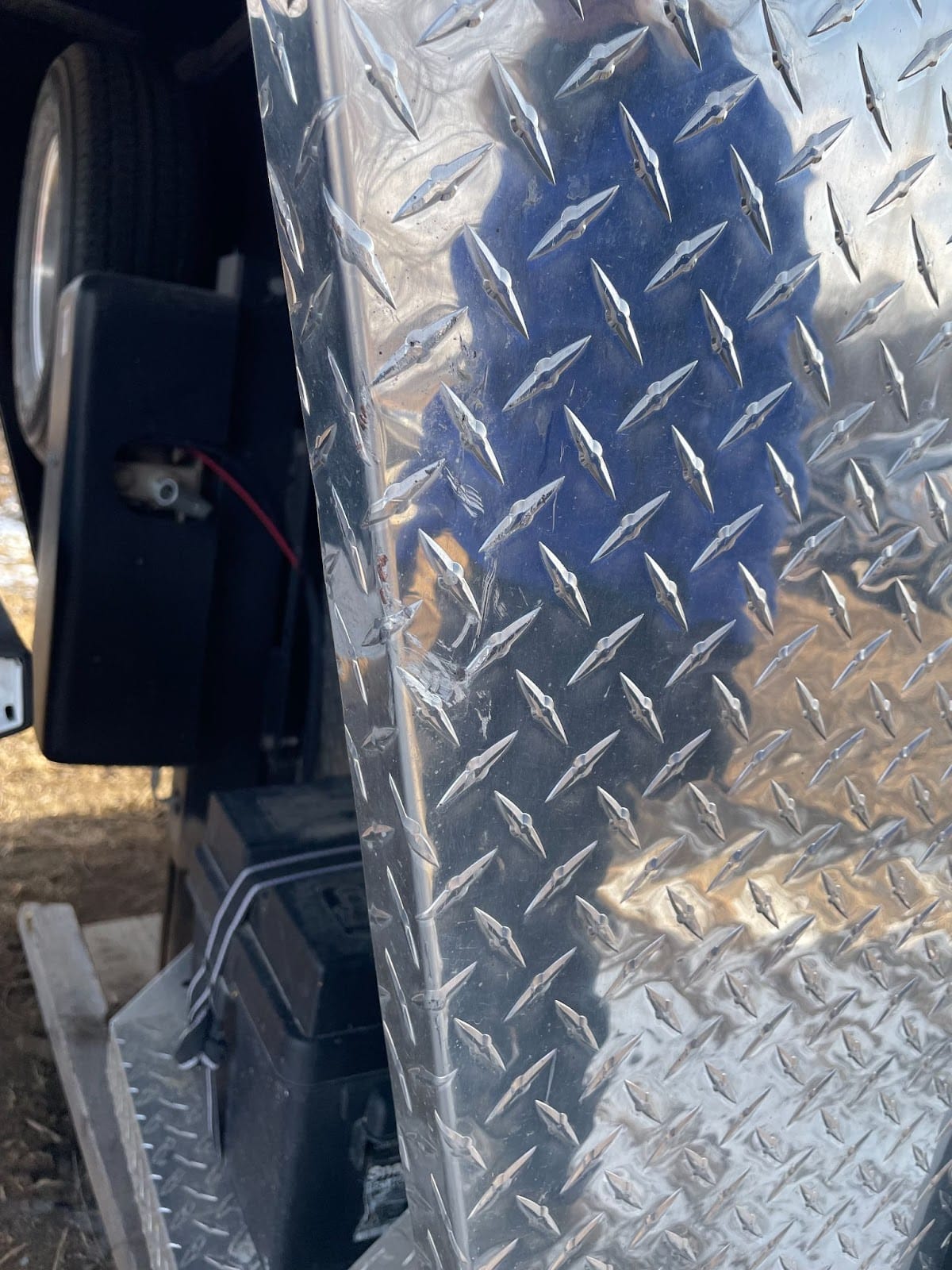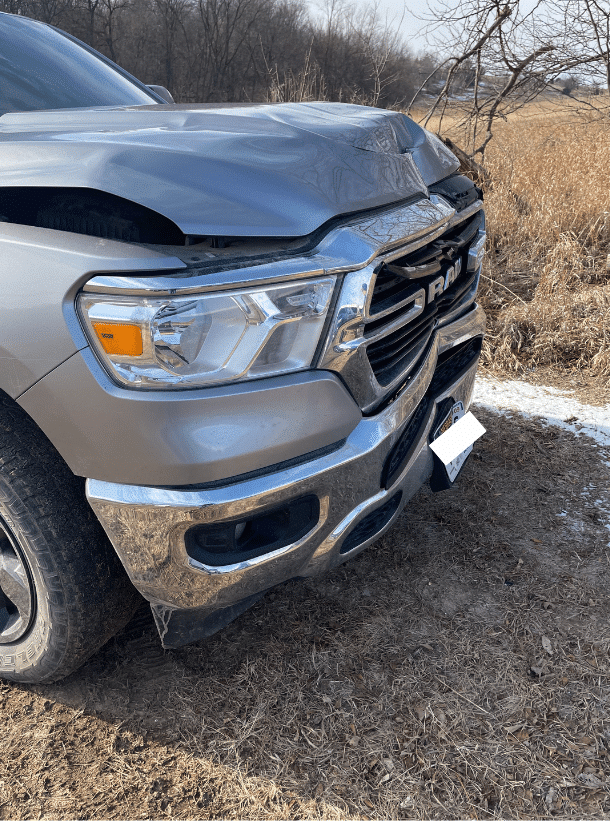Managing a Horse Trailer Accident
The truck and trailer shuttered for an instant and the two women knew something was wrong…
They had just rounded a sharp turn with their two horse bumper pull trailer when kicking and rocking made them pull over on the back country road.
Quickly, they hustled back to check on the quarter horse mare riding in the trailer. They opened the door to find her on her knees. She had completely lost her balance around the turn and fallen down.
Trying to sound calm, one women spoke to the mare from outside the trailer as she decided what to do. Then, with another huge shutter and boom, the mare managed to climb back up onto her feet and stand again inside the trailer.
This story has a happy ending.
Things were fine. No injuries. Just a few horse “huffs” of surprise. But any person knows that instant feeling of dread when they hear and feel a horse in distress back in the trailer.
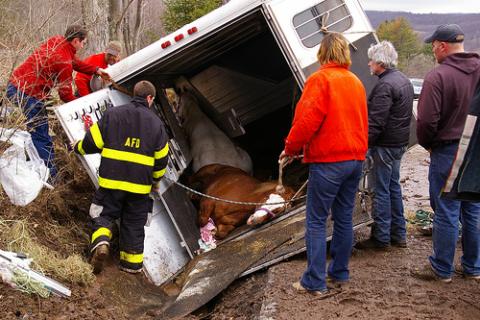 Now, imagine for a moment that those sounds were accompanied by the sounds of another vehicle – a roadway collision. Would you know what to do? Would you know how to help your horse?
Now, imagine for a moment that those sounds were accompanied by the sounds of another vehicle – a roadway collision. Would you know what to do? Would you know how to help your horse?
In this article, we’re going to talk about the best ways to deal with a horse trailer accident. Sometimes that accident is simply your horse getting himself into a bad position. Other times, it’s a much scarier event such as a car-on-trailer crash, slipping on wet roads, swerving from the wind, or blown tire when traveling on the highway. Regardless, the right safety steps may make a difference in protecting your horse from further injury.
6 Steps to Take for a Horse Trailer Accident
#1. Call for help right away.
If you need to pull over to help a distressed horse or if you are involved in a roadway collision, call for help right away. Police can help direct traffic, fire crews or large animal rescue squads can break into your trailer, and a veterinarian can quickly access your horse’s health. Don’t try to handle everything on your own.
At the same time, chances are these emergency responders don’t know much about handling horses. You are likely the horse expert here. So, keep a calm head and be ready to assist them as needed.
#2. Approach the trailer cautiously.
Just as the women above, don’t run back to the trailer screaming in panic. Even if your horse isn’t seriously injured, he’s definitely scared -- and a scared horse can be a dangerous horse. Approach the trailer slowly and try to assess the condition of your horse from outside the trailer.
Keep all doors and windows shut until you’re ready to attempt to extract your horse, horses sometimes see openings in horse trailers as paths to freedom, even if they’re much too small for a horse to squeeze through. During the entire process, stay outside the trailer as much as possible to avoid getting pinned into a tight spot.
#3. Clear a path to your horse first.
Yes, your horse is going to be panicked and he’s going to want to get out of the trailer right away, but before you untie him, remove everything that’s not bolted down. Some slant load horse trailers have a number of removable gates; make sure you get these completely out of the way to prevent further injuries. Only once everything is out of the trailer should you attempt to move your horse.
#4. Untie your horse last.
It’s always best to use breakaway ties with a horse that’s traveling, but if your breakaway failed or you didn’t use one to begin with, you’re going to have to be very careful when untying your horse. Many experts recommend cutting the tie rope with a knife on a long handle, since horse trailers are incredibly dangerous places to be if a horse is injured or scared inside. Leave as much rope as you can so you can get some control over your horse if he’s mobile.
#5. Above all else, remain calm.
Easier said than done, remaining calm is vital to a successful horse trailer accident recovery. Remember, a panicky horse is a dangerous horse. Even if you’ve owned that horse for a decade, he’s not going to act like “your horse” during an accident. He’s scared. So, treat him like you would a wild animal and don’t let him feed off your emotions.
#6. Have your horse checked by a vet.
Even if you don’t have a vet on the scene of the accident, have you horse checked over by a vet as soon as possible. He may look fine on the outside but will still be at risk for stress-induced colic, hyper/hypothermia, organ displacement, or dehydration.
Your First Horse Trailer Accident Defense: Trailer Safety Features
-
Multiple Access Doors
First, we recommend you find a trailer with multiple points of entry for you and your horse. Many traditional slant load and straight load trailers only have one rear doorway with human-sized escape doors near the front. If you have three or more horses, you’d need to offload all of the animals to reach the one in the front.
Instead, look for a trailer that allows you to reach each horse individually…
Our SafeTack slant load trailer comes with an option for side loading doors and ramps. This feature allows owners to walk their animals onto the trailer through a side door and back into their stall. Then, to offload, the owner can simply open the divider and walk the animal straight off the rear ramp.
This configuration is much less stressful for the animal. More importantly, it allows emergency workers a second doorway to reach your horse after an accident. Read more about why the SafeTack design is the safest trailer design for horses.
Check out our SafeTack Reverse 3 horse gooseneck trailer with a double side ramp — each horse can be reached independently.
-
Quick Release Dividers and Chest Bars
For larger horses, many prefer straight load trailers with chest bars in the front. On some horse trailer brands, this can be a problem when an animal rears up and hooks a leg over this front bar.
Make sure your chest bars and dividers all have an easy-release pin so they can be taken down even under the full weight of a horse. All of our straight load trailer chest bars have this quick release feature.
Large horse owners may also want to consider one of our warmblood slant load horse trailers which avoid this chest bar issue completely. Horse stalls can be enlarged to fit animals at 17+ hands.
-
Strong and Reliable Flooring
One of the scariest roadside accidents you will ever see deals with horse trailer floors that fail midway through a trip. Sometimes, corroded aluminum floors will develop weak spots where a horse’s hoof can break through.
This results in severe injury for any horse involved. Instead, look for treated lumber with rubber mats on top that are checked regularly and kept dry and clean. Better yet, opt for a synthetic floor system like Rumber that is both strong and durable.
-
Protective Trailer Frame
Finally, you need to choose a trailer that is built from the right horse trailer materials to survive a roadway accident. Aluminum horse trailers may look snazzy, but they certainly don’t stand up well in collisions. This has been shown in crash safety tests. In contrast, steel framed trailers are much stronger but prone to rust.
If you want the best of both worlds, go with an impregnated zinc material like that found in our Z-Frame construction. This trailer frame is as light as aluminum but as strong as steel. It creates a safe and protective cage around your horse.
-
Independent Access Doors
Find a horse trailer that has multiple points of exit and entry for you and your horse. Many slant load horse trailers are designed with a single rear loading door. In the case of a rear-end collision, this door may be bent out of shape and difficult to open. Or, if you have a horse loaded towards the front of the trailer who is in distress, you would need to unload ALL of the horses to get to him.
A trailer with a second horse-sized door on the side of the trailer will allow a second point of exit and entry. Even if your accident is much less severe – perhaps a horse that is panicked after a hornet sting – independent access can make a big difference. You’ll be able to get to your distressed horse individually without having to unload all of the other horses as well.
-
Protection from a Rear-End Collision
Many road way collisions with horse trailers are likely to involve rear-end collisions. The motorist behind you just isn’t paying attention and hits the brakes too late.
The right type of trailer will have extra protection in the rear of the trailer to help protect your horses. For instance, a horse trailer with separate full-height doors and an additional ramp folded up on the outside will have an extra layer of protection.
Our SafeTack compartment is designed as an extra crumple zone to absorb the impact from a collision. It also has an extra divider behind the rear-most horse. With the extra safety partition and SafeTack crumple zone it will greatly reduce the risk of injury to the horse.
-
Strong Interior Walls
Another safety feature to consider for preventing an accident are the interior horse walls. The interior walls on aluminum horse trailers are typically 0.040 thickness, which is VERY thin. Think of it this way – aluminum soda cans are 0.014 thickness, so aluminum trailer walls are only three times as thick as a can of soda. Yikes! Imagine what would happen when your large unruly horse kicks and crashes into the walls.
The interior walls on our horse trailers are built with 16 gauge Galvalite metal. In strength tests, this material has been proven to be five times stronger than 0.040 aluminum! Plus, the skin is fastened to the trailer frame using 3M chemical bonding rather than rivets.
-
Properly Designed Interior Dividers
Next, look for a trailer with strong interior dividers that would be able to withstand the force from your 1500 lb + Warmblood – even when he’s completely freaked out. Aluminum dividers in aluminum horse trailers will simply not handle the stress in that situation. In fact, they can bend, tear and break (leaving behind jagged metal edges) causing even more injury to your horse.
Instead, look for a trailer with Z-Frame dividers. This zinc-impregnated metal is lightweight and actually has a stronger tensile rating than steel.
-
Strong and Reliable Flooring
Some of the worst horse trailer accidents happen simply because the floor of the trailer wasn’t strong enough to hold a horse’s weight. Corroded metal floors can develop pock marks and weak spots that may fail at any given time.
That’s why it’s important to pay special attention to your horse trailer’s floor. We recommend durable treated pine lumber with rubber mats on top rather than any sort of metal or metal-coated flooring. Better yet, opt for a synthetic Rumber flooring for strength and durability.
How Does a Double D Trailer Withstand a Horse Trailer Accident? [Client Testimonial]
Throughout the years, we have had many clients reach out to us with concerns of the safety and durability of their horse trailers. Here at Double D Trailers, our main priority in the construction of our trailers is safety. Not only do our horse trailers focus on safety features that are convenient and helpful for both you and your horse, but we also strive to make trailers that can withstand unexpected scenarios.
Kacey, who owns a 2 Horse Slant Load Gooseneck, recently reached out to us to share her story.
“As is typical in Nebraska things get a little slippery in the winter. At the facility I board at, one of the individuals came down the driveway and ended up sliding into my parked trailer. I thought this was a great testimonial as to how well built these trailers are. There is over $8500 worth of damage to the truck and the closest thing I could find to a scratch was on the diamond plate. Other than that there was absolutely no damage to the trailer.
I can’t tell you how much I have enjoyed having this trailer. I love it and I have people stop me all the time and ask to look at. They love the open design and the safety features. Thanks again. Best horse purchase I have ever made (other than my horse)!”
If you ever find yourself in a horse trailer accident, whether on the roadway or in an unexpected scenario like Kacey, a little bit of knowledge about how to act may make the difference. If you have any questions about the trailer safety materials described in this article, feel free to contact Brad today.

